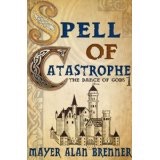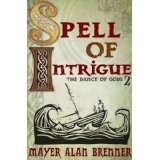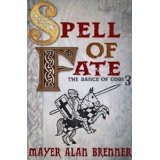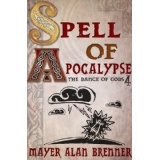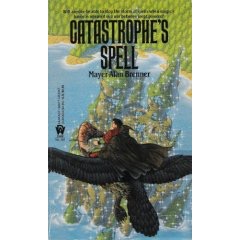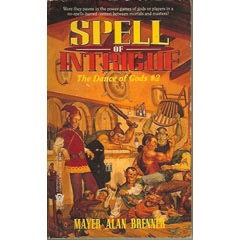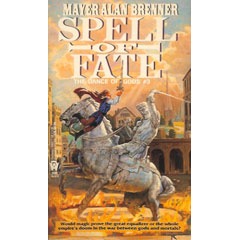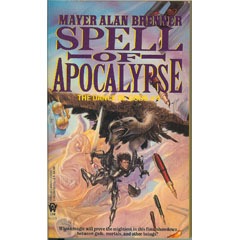A recurring theme throughout these notes are the previous works that influenced me and that I've drawn on, and subsequent works with similar strains or aims that I respect. It would be inappropriate and downright wrong to claim that any of these works published after mine were similarly influenced by me, for no other reason than it's hard to claim influence when you can't even claim more than a cumulative handful of readers. I'd be overjoyed at the thought that something I'd written had an impact on another writer - positively or negatively - and I'd have absolutely no problem with it. (Within certain limits. I'm completely aghast at the type of literary strip mining practiced by, for example, Michael Crichton. For an example that I am not nearly the first to point out, compare Bruce Sterling's Heavy Weather and Dr. Crichton's Twister.) But I am a huge believer, as these notes emphasize, in the ongoing dialogue that has continued over years and even generations between creative works, a phenomenon that has been particularly powerful in the evolution of speculative fiction, from the hard scientific to the out-and-out fantastical. Watching this call-and-response ping-pong game is quite a rewarding spectator sport.
But we've also seen the gradually increasing complexity of texts over time. "
If I have seen further, it is by standing on the shoulders of giants," said Newton, although he wasn't talking about fiction but physics. Still, the way this process repeats itself over so many domains and so many years leads one to suspect that it must reflect a fundamental law of humanity, or at least civilization. Software, technology of all sorts, economic systems - indeed so many of the underpinnings of the modern world - have been developed only through multiple iterations and many talented voices responding to and building upon the works around them.
Not quite a flip side to this pattern of inheritance and descent, but more of a companion, has to be
convergent evolution. To retreat back again from technology and evolutionary biology to writing, there are some ideas that just keep being rediscovered, keep bubbling up from the primordial ooze, as it were. Analogous plot situations often seem to lead to similar solutions. Here's one:
The clever, sly, subtle, and utterly delightful
Charles Stross
, in
The Jennifer Morgue
, used destiny entanglement in a very similar way to the metabolic linkage between Gash and the detective in
Catastrophe. I want to clearly underline again that I'm not saying that any inappropriate appropriation has taken place, or any appropriation at all, frankly. I'd be proud to claim that a line of descent ran from
Catastrophe to
The Jennifer Morgue, but I don't believe it for a moment. If anything,
Catastrophe's metabolic linkage is the dorsal fin of the ichthyosaur, gone extinct with no lineal descendants, while
Jennifer's destiny entanglement is the dorsal fin of the shark, alive and swimming mightily and the terror of the seas. To an external observer, though, the two plots devices seem conceptually analogous and a fine example of convergent evolution. However Mr. Stross arrived at his destiny entanglement, I love it, I admire its perfect development in the context of his story, and I'd be honored to share a toast with him at any available time.
Another theme I've touched on several times is how genre boundaries are an increasingly porous membrane ... but this note is already long enough and of sufficiently inflated density that perhaps this one can wait until later.
**
I don't think it's possible to read this chapter now without thinking of the great
Indian Ocean tsunami of 2004. It seems as though I didn't do too badly in the descriptive sections - if it's appropriate to use a phrase like this in this context - although Max should probably have had more trouble swimming through the backwash. I haven't tinkered with that material, though: for one thing, the dynamics of the Roosing Oolvaya wave might be different enough to allow for the possibility, and for another thing, poetic license still seems the right thing to use here, to get Max out to the castle as quickly as possible.


